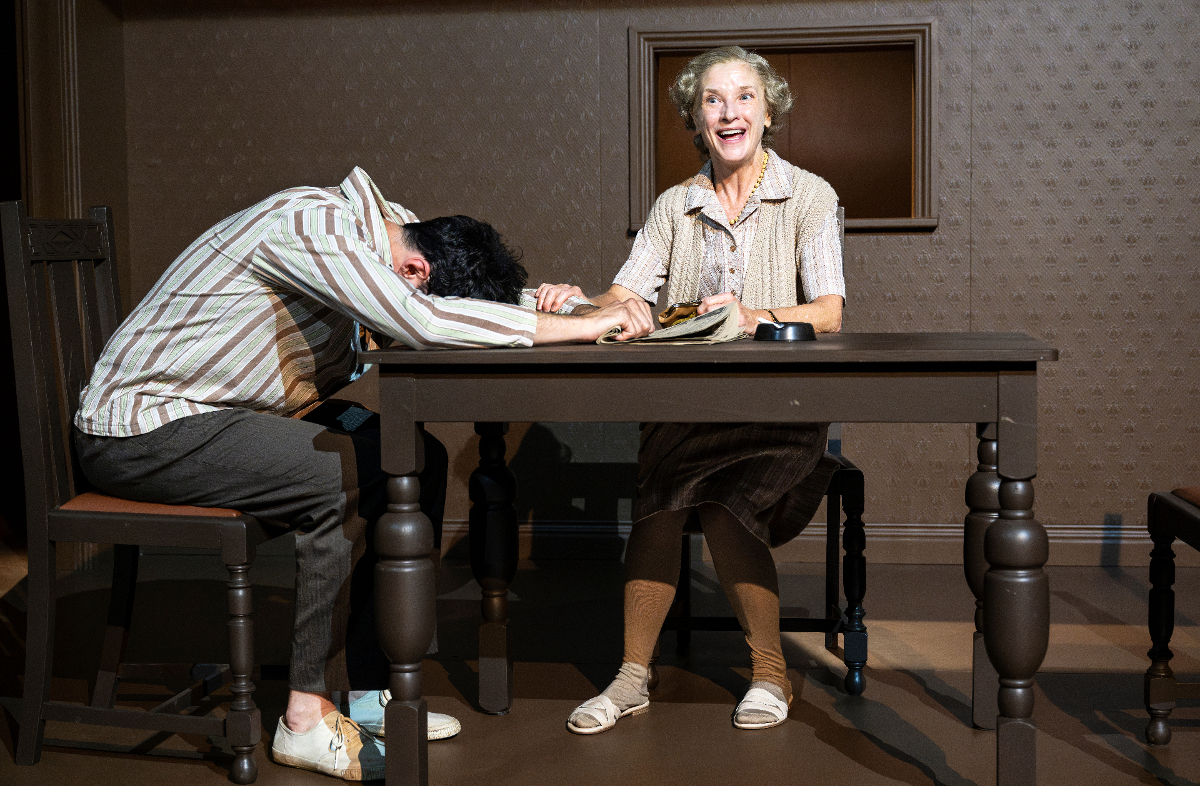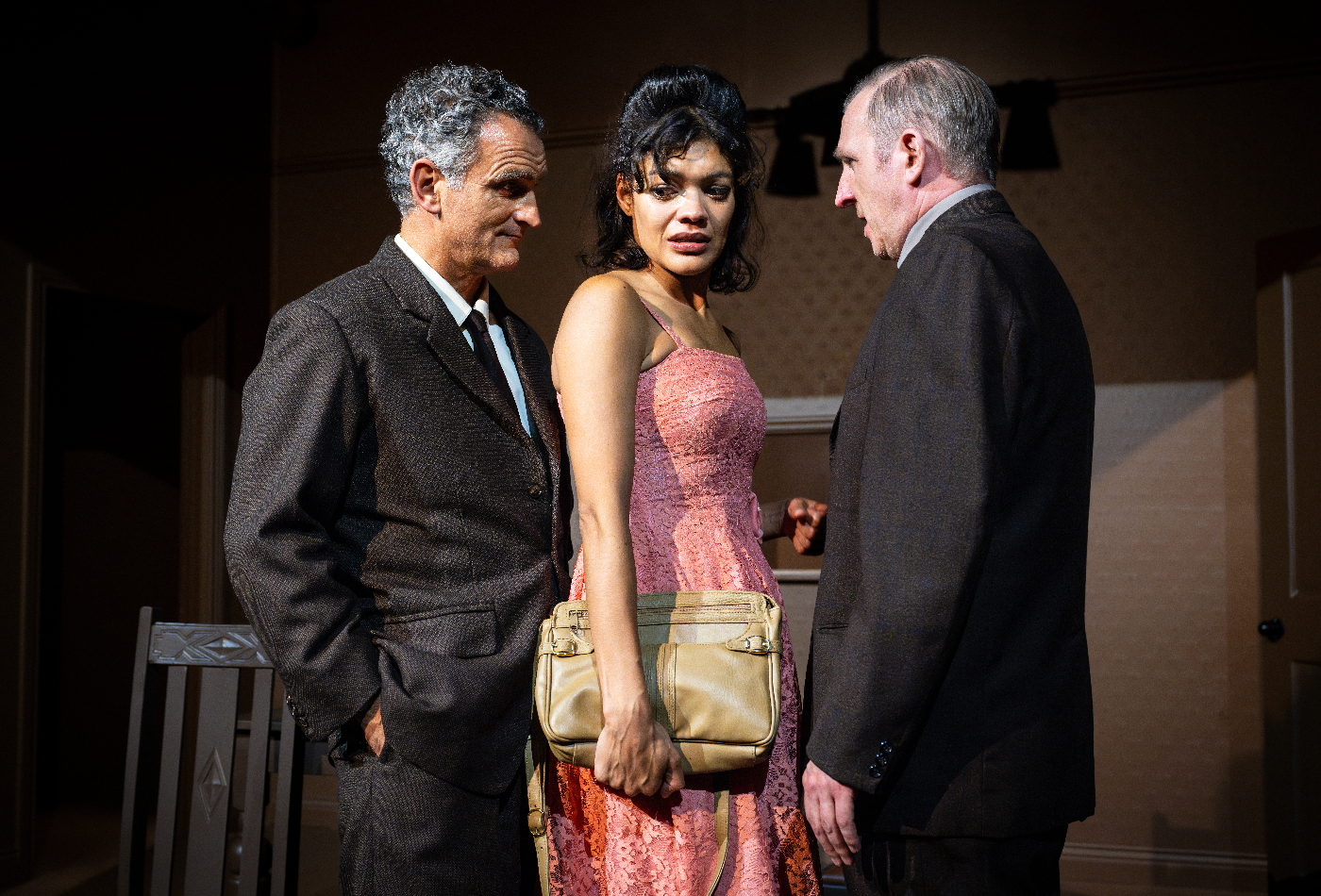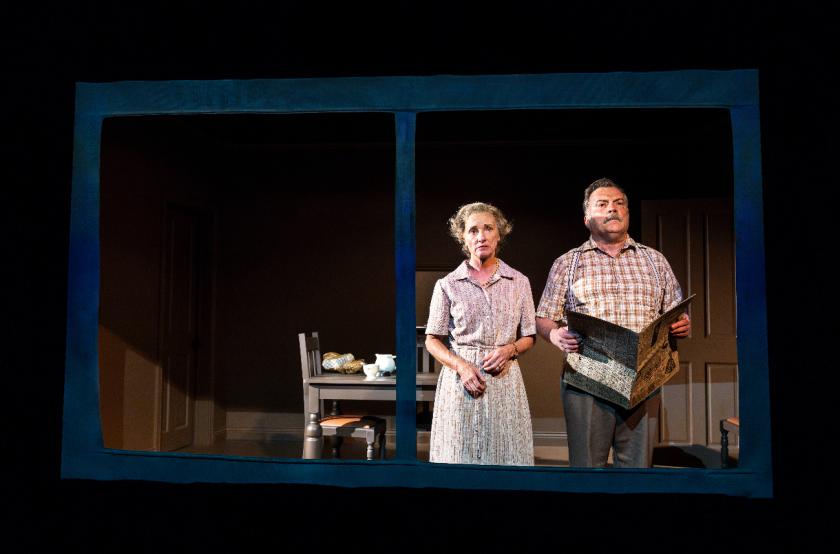Before a word is spoken, a pause held, we hear the seagulls squawking outside, see the (let’s say brown) walls that remind you of the H-Block protests of the 1980s, witness the pitifully small portions for breakfast. If you were in any doubt that we were anywhere other than submerged beneath the fag end of the post-war years of austerity, the clothes confirm it. And a thought surfaces and will jab throughout the two hours runtime: “How different are things today in, say, Clacton?”
But Ultz’s design work has grounded Harold Pinter’s second play firmly in pre-Beatles England, where even Elvis Presley's hips had yet to challenge the long hangover of wartime attitudes and demographics. Jeez, it's grim. A conversation that is barely worthy of the label passes between a man and his wife, bereft of colour, metaphor or even a descriptor beyond a repeated, relentless "nice". It speaks to a narrowness of imagination, a paucity of curiosity, an enveloping complacency. Not for the first time, I reflected on how readily those on the Left blessed with the privilege of education, can disdain those whom they, at least nominally, champion.
A conversation that is barely worthy of the label passes between a man and his wife, bereft of colour, metaphor or even a descriptor beyond a repeated, relentless "nice". It speaks to a narrowness of imagination, a paucity of curiosity, an enveloping complacency. Not for the first time, I reflected on how readily those on the Left blessed with the privilege of education, can disdain those whom they, at least nominally, champion.
Jane Horrocks (pictured above with Sam Swainsbury) – answering the question “What would Absolutely Fabulous’s Bubble be like in middle-age?” – lends Meg, the landlady, no little charm, but the cruel comedy is found in her dimwittedness and her inability to read social cues. These days, that might lead to a consideration of whether or not she is on the autism spectrum, which inevitably shrivels a few laughs in the back of the throat, but nobody in the house is expecting an easy ride from this play. Two walked out after 30 minutes of the matinee I saw, quite an impressive feat for a 67-year-old text.
Meg’s husband, Petey, is an everyman, an observer, our conscience in this parade or gargoyles, Nicolas Tennant’s well-judged performance suggesting his realisation, too late, that he should have intervened as things spiral out of control. Is this an admonishment for his generation’s passivity in the face of the rise of Nazism three decades earlier? Or is just what men of his age do with a copy of the Daily Mirror, a Woodbine and a slice of fried bread for breakfast? Of course, with this writer, it could be either, or both, or neither – that’s how you get a Nobel Prize half a century or so later.
Director, Richard Jones, gives us the first of many jolts with the arrival in the boarding house’s dining room (though that phrase feels too large) of Stanley, the long-term lodger, a generation younger than Meg and Petey and obviously depressed, maybe bipolar. He craves, but is also repelled by, the attention Meg pays him and there’s enough lewdness in her manner to imply that there might be more than a cuppa Typhoo on offer when she wakes him each morning. Sam Swainsbury captures Stanley’s frustration at his inability to escape the tiny life into which he has boxed himself, but his fearful reaction when he learns of "two gentlemen", who may be visiting, gives us a glimpse into why a (relatively) sophisticated man would be living in such intellectual and physical squalor. Swainsbury comes closest to toppling into caricature in a cast who must tread a bit of a tightrope on that score – he doesn't quite fall off, though.
When the menacing pair arrive bearing slippery identities and multiple names, John Marquez’s Goldberg (pictured below with Carla Harrison-Hodge and Caolan Byrne) is a malevolent Arthur Daley and Caolan Byrne’s McCann (of all names) like a Terry as played by Ray Winstone, Stanley is almost rendered inert with fear and, one suspects, guilt. That Goldberg and McCann have a job to do on him (though probably not a gangland hit) is obvious, but quite what has happened to bring them all to this place at this time is unclear. Goldberg also gets to flex his alpha-male muscles with Lulu, Carla Harrison-Hodge in a thankless role as a younger, not quite as dim, version of Meg, who is nevertheless equally desirous of male attention and equally lacking in judgement as to the potential consequences.
The women in this play get a rough ride in every sense. One feels that a writer like Pinter comes freighted with such a reputation (how many playwrights acquire their own adjective in their own lifetime?) that one should read a couple of monographs before taking one’s seat. Not necessary, of course, but it’s still remarkable to see the roots of Joseph Losey’s 1963 film The Servant, starring an unforgettable Dirk Bogarde in this earlier script, and also catch the vibe of some of the darker episodes of The Comic Strip Presents 20 or so years later. There’s also plenty of opportunities to indulge in that delicious ambiguity that Chekhov so often supplies – “Should I be laughing or crying now?”
One feels that a writer like Pinter comes freighted with such a reputation (how many playwrights acquire their own adjective in their own lifetime?) that one should read a couple of monographs before taking one’s seat. Not necessary, of course, but it’s still remarkable to see the roots of Joseph Losey’s 1963 film The Servant, starring an unforgettable Dirk Bogarde in this earlier script, and also catch the vibe of some of the darker episodes of The Comic Strip Presents 20 or so years later. There’s also plenty of opportunities to indulge in that delicious ambiguity that Chekhov so often supplies – “Should I be laughing or crying now?”
This production has many echoes of the same director/designer team’s Machinal, which also started in the Ustinov Theatre’s claustrophobic confines, before striking out to great acclaim in the West End. Your reviewer found that production disengaging rather than affecting, but The Birthday Party is more accessible, more intriguing, more disturbing.
More, dare I say it, Pinteresque.















Add comment